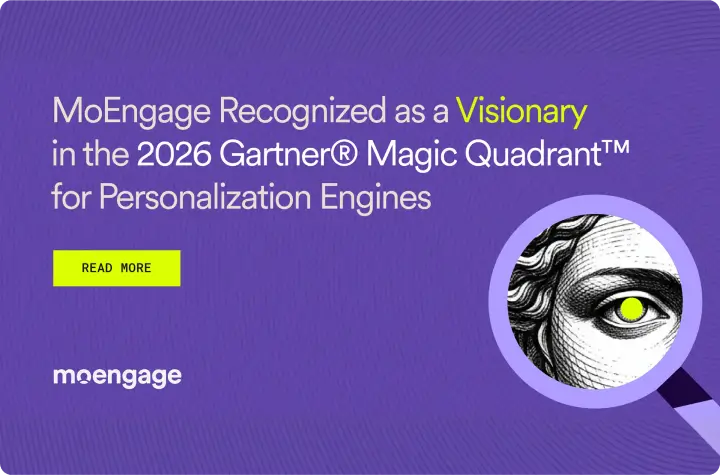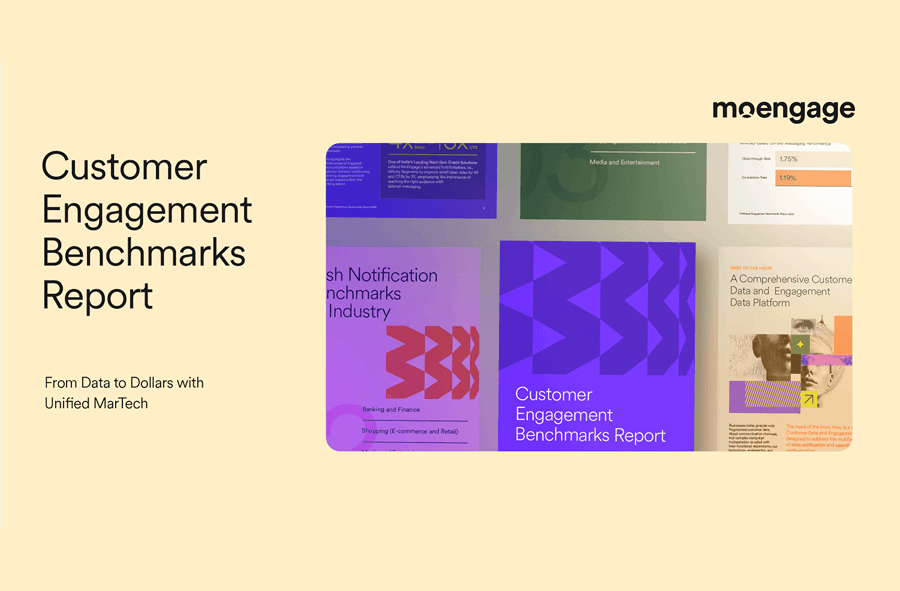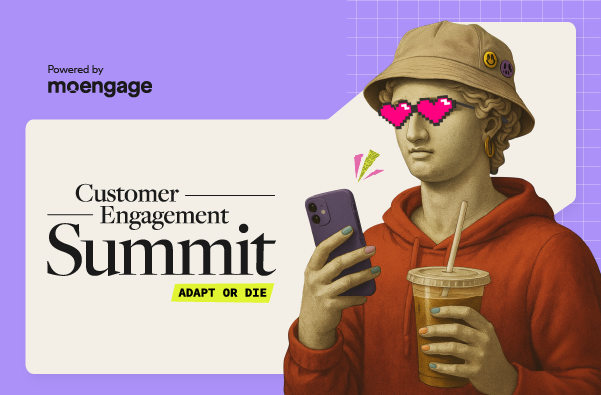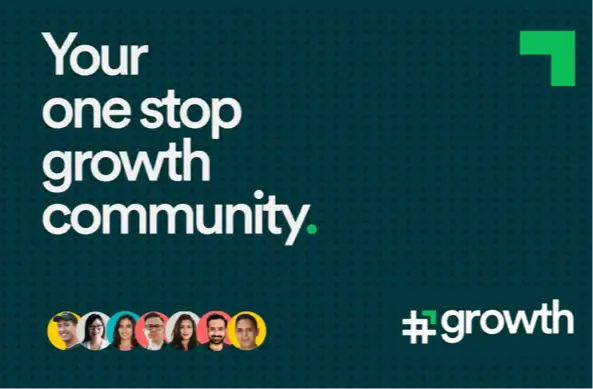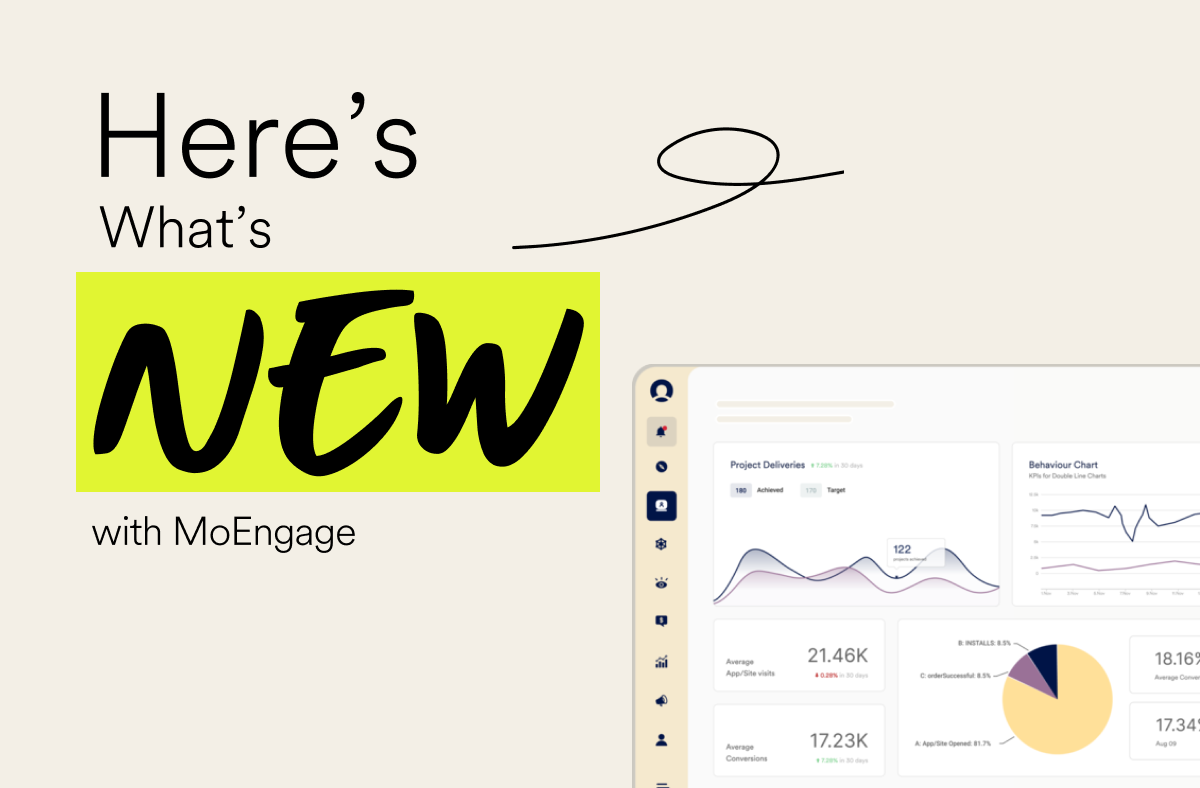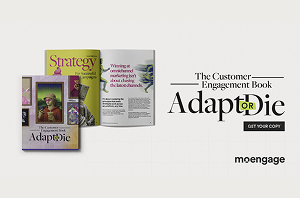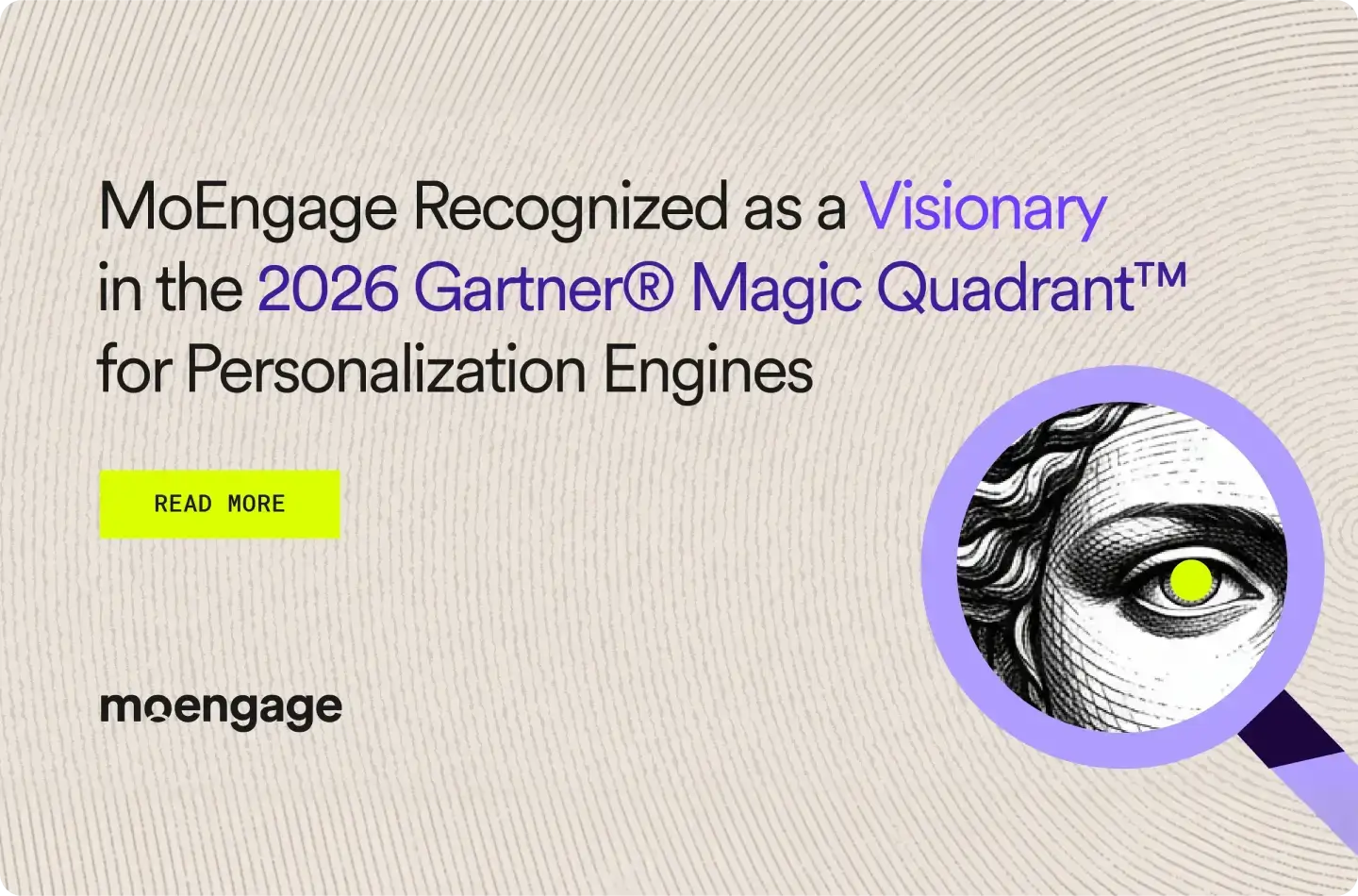Breaking the AI Hype Cycle: Webinar Recap
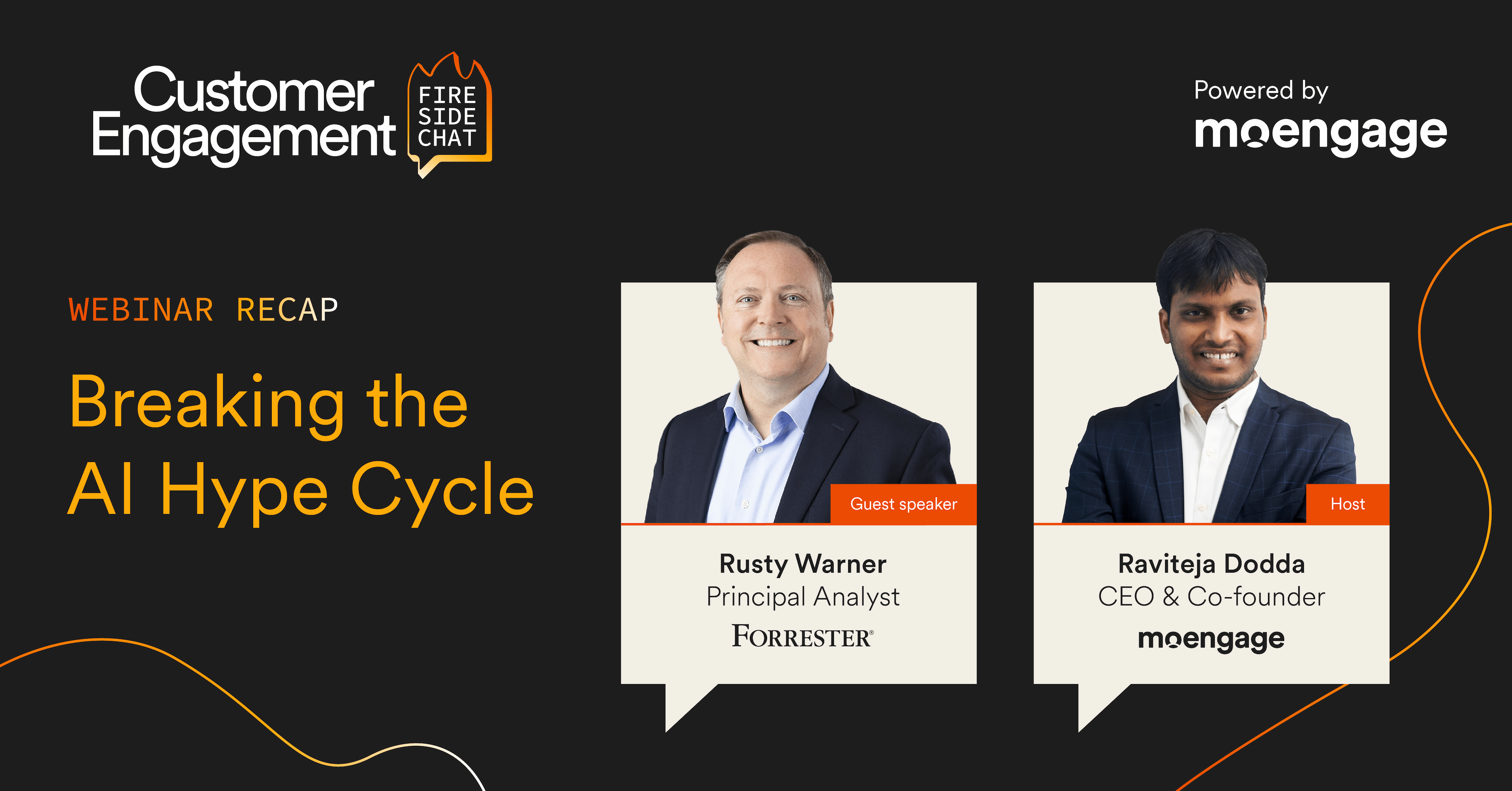
Artificial Intelligence is transforming marketing, yet many marketers struggle to separate genuine opportunities from the surrounding hype.
In a recent fireside chat, guest speaker Rusty Warner, VP & Principal Analyst at Forrester, and Ravi Dodda, CEO of MoEngage, tackled this challenge head-on, exploring actionable AI use cases, the critical role of data, and how to leverage AI for lasting business impact.
Get the details from their conversation in this recap.
Cutting Through the AI Hype: Key Use Cases in Marketing
AI is everywhere, but understanding its real-world applications can feel daunting. Rusty Warner introduced Forrester’s practical framework, outlining five key AI use cases in marketing:
1. Employee Support Agents (So Hot Right Now)
The most immediate and prevalent AI application today is employee support agents, digital assistants, or copilots. These tools simplify everyday marketing tasks through natural language interfaces, facilitating content creation, segmentation, and workflow automation.
“Employee support agents are hot right now. They’re already in production across sectors like retail, hospitality, media, and even regulated industries like financial services and insurance,” Warner explained.
2. Enterprise Automation Agents (Gaining Momentum)
Another critical area is enterprise automation agents, or “TuringBots,” designed to automate routine business functions like data migration, forecasting, and supply chain management.
Warner highlighted significant traction, especially in retail and consumer goods.
However, adoption in regulated sectors like financial services is slower due to compliance complexities.
3. Consumer Engagement Agents (Emerging & Exciting)
Warner spotlighted consumer engagement agents, AI-driven chatbots delivering intuitive, conversational self-service experiences, as an exciting area beginning to take off.
“We’re starting to see AI chatbots empower brands to engage customers conversationally and effectively,” Warner shared, noting ongoing experimentation despite limited full-scale deployments.
Two additional future-oriented categories, fiduciary agents for governance and consumer agents acting as digital doubles, round out the AI landscape, though Warner noted these are further down the line.
Generative AI’s Current Impact in Marketing
The practical potential of generative AI is already evident, especially in content creation and operational efficiencies:
- Content Creation: Generative AI rapidly creates initial drafts, production-ready content, and multiple variations for optimization testing.
- Complex Task Simplification: Marketers increasingly use generative AI’s natural language capabilities to streamline audience segmentation, interpret analytics, and receive proactive optimization recommendations.
- Operational Efficiency: AI aids in aligning budgets, scheduling campaigns, and preparing creative briefs, significantly enhancing productivity.
Warner emphasized that these current benefits set the stage for deeper integration with customer feedback and real-time data to align marketing activities with actual customer journeys.
Data: The Essential Foundation for AI Success
AI is powerful, but its effectiveness hinges on one critical element: data. Warner and Dodda both highlighted the necessity of having a robust, unified customer profile spanning all organizational functions, not just marketing. Collaboration with IT is essential to break down data silos and enable seamless integration.
“AI is only as good as the data it uses,” Warner emphasized. He further stressed the growing importance of zero-party data, information explicitly shared by customers, which enhances personalization and trust.
Dodda echoed this sentiment, stating, “We see many of our customers investing heavily in data platforms and strategies. Without high-quality data and unified customer profiles, achieving meaningful results from AI is challenging.”
Managing Change: Organizational Readiness and AI
The successful integration of AI into marketing demands significant organizational change. Dodda and Warner discussed how workflows must evolve, highlighting the importance of managing change, obtaining buy-in from legal and creative teams, and fostering collaboration across departments.
“People inherently resist change,” Warner noted. “Making AI part of everyday workflows can ease this transition, but broader governance and strategic alignment remain critical.”
Dodda reinforced this point, adding, “AI can significantly augment human intelligence, giving marketers and product teams ‘superpowers’ to make better, faster, and more data-driven decisions.”
Short-Term Efficiency vs. Long-Term Impact
Dodda and Warner stressed the dual impact of AI: short-term efficiency gains and significant long-term value creation.
- Short-Term: AI boosts immediate productivity, streamlining campaign creation and orchestration, freeing resources for strategic tasks.
- Long-Term: Beyond efficiency, AI enables deeper customer understanding and effective personalization, directly driving higher engagement, conversions, and revenue.
Long-term, Warner predicts an even greater impact as AI empowers marketers to shift from a revenue-only mindset to a profit-focused approach, aligning marketing directly with broader business goals.
“AI will transform marketing into a profit center, not just a cost center,” Warner explained. “Customer lifetime value becomes a strategic profit calculation, aligning marketing closer to CEO and CFO priorities.”
Dodda added, “Brands that effectively leverage AI won’t just improve short-term campaign efficiency; they’ll fundamentally enhance customer understanding, build trust, and drive long-term profitability.”
Closing Thoughts & Next Steps
AI isn’t a distant future; it’s here now, offering marketers powerful tools to enhance efficiency, deepen customer relationships, and fundamentally redefine their strategic impact.
MoEngage, as highlighted by Ravi Dodda, positions itself as a partner for brands ready to leverage AI strategically, not only improving immediate campaign performance but establishing a robust foundation for enduring customer engagement and long-term profitability.
Curious to explore these insights further? Watch the full webinar on-demand and learn directly from these industry leaders.


